
“With increasing available data on the adverse impacts of the pandemic on middle-income countries such as the Philippines, we believe that it is imperative, and the only decent way forward for our people, that the UN system, the global community, respond accordingly and concretely.” – Ambassador Enrique Manalo at the General Debate of the UN Second Committee, 05 October 2020
08 December 2020, New York – The United Nations Second Committee concluded its session, with the adoption of the Quadrennial Comprehensive Policy Review (QCPR) resolution.
A total of 35 resolutions were adopted by the Second Committee, 30 of which were initiated by the Group of 77 and China (G77 and China), the largest negotiating group in the UN composed of 134 developing countries including the Philippines. Of the 35 resolutions, 24 were adopted by consensus and 11 by a recorded vote.
Due to the challenges posed by the COVID-19 pandemic, the Second Committee decided to undertake full negotiations only on two resolutions: the QCPR resolution and the Mid-term comprehensive review of the implementation of the International Decade for Action, Water for Sustainable Development (2018-2028); with negotiations on other resolutions limited to technical updates and COVID-19 specific paragraphs. The Committee also negotiated a cross-cutting paragraph that recognizes the general impact of COVID-19 on economic and development issues. This paragraph was incorporated in all Second Committee resolutions.
One of the notable outcomes of the Second Committee work was the adoption by vote of the QCPR resolution, the overarching tool for Member States to provide policy guidance to the United Nations Development System (UNDS) and hold it accountable. The resolution is discussed every four years in the Second Committee and is mandated to cover all aspects of operational activities for development of the UN system in the implementation of the 2030 Agenda. As the host of 17 agencies, funds and programmes which form part of the UN Country Team, the Philippines actively engaged in the 2020 QCPR negotiations, particularly in ensuring the support of the UN system to middle-income countries.
The Philippines coordinated the resolution on International Migration and Development on behalf of G77 and China. The resolution recognizes the positive contribution of migrants to sustainable development and to COVID-19 response and recovery efforts in countries of origin, transit and destination; and calls for the full inclusion of migrants in the pandemic response and recovery efforts. The resolution also took note of the impact of the pandemic on remittances and on families and communities that depend on them. While the resolution was voted due to traditional positions on global migration governance, the resolution was supported by an overwhelming vote of 178 in favor of its adoption.
The Philippines also co-coordinated on behalf of the G77 and China the resolution on the Implementation of the Convention on Biological Diversity and its contribution to sustainable development which was adopted by consensus. The resolution underlines that the COVID-19 pandemic has highlighted the urgent need to reduce the risk of the economic, social and environmental impacts of disasters and future pandemic outbreaks; and urges Parties to the Convention and all relevant stakeholders to mainstream biodiversity into COVID-19 response and recovery efforts. The resolution also reaffirms the shared commitment to a post-2020 global biodiversity framework that contributes to the 2030 Agenda for Sustainable Development and the realization of the 2050 Vision for Biodiversity.
Further, the Philippines co-facilitated with Indonesia the negotiations on the resolution on Information Communications and Technologies for sustainable development, which was adopted by consensus. The resolution notes that the impact of the COVID-19 pandemic exacerbates inequalities caused by the digital divides; and recognizes the important role of ICT for attaining the SDGs and for a sustainable, inclusive and resilient recovery from the pandemic. The resolution calls upon all stakeholders in the ICT sector, including Governments and the UN system, to strengthen their efforts to bridge the digital divides within and between developed and developing countries; promote digital access and digital inclusion; and expand accessible and inclusive distance learning solutions and digital health services.
In addition to the 30 resolutions tabled by the G77 and China, the Philippines also co-sponsored the resolutions on “The United Nations Conference on the Midterm Comprehensive Review of the Implementation of the Objectives of the International Decade for Action, Water for Sustainable Development, 2018–2028,” and “International cooperation and coordination for the human and ecological rehabilitation and economic development of the Semipalatinsk region of Kazakhstan.”
The Second Committee commenced its session on 02 October 2020, with an organizational meeting that considered how to effectively manage negotiations with a hybrid of in-person and virtual format due to the COVID-19 pandemic.
The Second Committee discusses economic, financial and sustainable development issues such as, among others, the SDGs; macroeconomic policy questions; financing for development; health; human settlements; international migration and development; eradication of poverty; operational activities for development; agriculture development, food security and nutrition; disaster risk reduction; climate change; biological biodiversity and information and communications technologies for development. END.


